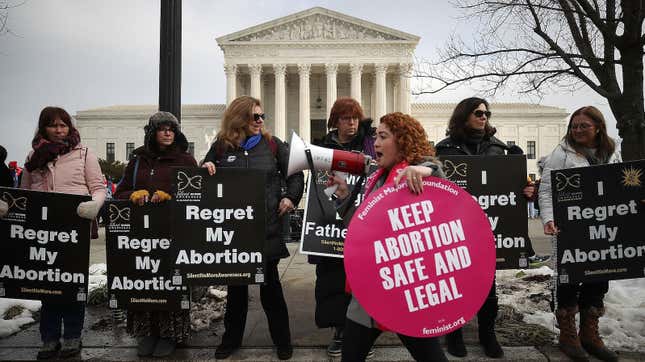

On Tuesday evening, just a week after Georgia’s governor signed a bill criminalizing abortions at six weeks, Alabama’s Republican-controlled legislature passed a bill that, if signed and enacted, could jail doctors for up to 99 years for performing or attempting to perform an abortion at any point during a pregnancy—making only one exception for life endangerment. It’s brazen, and that’s the point: Alabama Representative Terri Collins, the bill’s sponsor, has said she hopes that a legal challenge will force the conservative-leaning Supreme Court to reconsider Roe v. Wade.
So what happens now?
Mary Ziegler, a law professor at Florida State University who has studied the history of the abortion debate and policy, believes that Collins may eventually get her wish of overturning Roe, but sees the more pressing threat in comparatively “moderate” abortion bans, like 20 week laws. “The Alabama law and the Georgia law are probably the ones that are getting the most attention, but they represent only one of several strategies to overturn Roe,” Ziegler told Jezebel. Rather than outright dismantling Roe in one fell swoop, as Alabama’s law challenges the high court to do, Ziegler argues it’s more likely that laws that incrementally curb access to abortion are the greater legal threat to Roe.
There are several laws— like Louisiana’s admitting privileges law that requires abortion providers to hold unnecessary business contracts with local hospitals—that are currently working their way up to the Supreme Court.
Two dozen states have bans on abortions between 13 and 24 weeks of pregnancy, claiming, against medical consensus, that fetuses can feel pain at 20 weeks. But Roe protects abortion up till the point of viability, and a fetus isn’t viable at 20 weeks. As Vox explains, if the Supreme Court upholds the bans, “it would dismantle a very basic principle of Roe v. Wade.”
Rewire News, a site that closely covers reproductive justice and the courts, shares this assessment:
Legal experts believe these laws are unconstitutional on their face because they undermine a key provision of Roe v. Wade, which established the right to an abortion in the United States up until fetal viability, generally determined by doctors to be around 24 weeks’ gestation. Were the U.S. Supreme Court to uphold one of these bans, it would effectively dismantle the backbone of the court’s 1973 decision legalizing abortion in the United States. Anti-choice leaders have been open about their long-view strategy involving 20-week abortion bans—to persuade the high court to overturn the viability principle on which Roe rests.
Alabama’s law is, however, likely too extreme for the Supreme Court to uphold, according to Ziegler. “We’re in a world of a lot more uncertainty when it comes to what the Supreme Court’s going to do than we have been in decades, but it’s still hard for me to imagine Chief Justice Roberts, given how much he seems concerned about optics and the reputation of the Court, doing something so high-profile and so controversial so quickly with so little lead up,” Ziegler said.
Linda Greenhouse, the Knight Distinguished Journalist in Residence and Joseph M. Goldstein Lecturer in Law at Yale Law School who also covered the Supreme Court for decades, told the New Yorker that she sees other incremental restrictions—like admitting privilege laws—as the more likely laws to reach the court and go up against Roe.
“I actually think the challenge to Roe will come with ostensibly milder measures that will let the courts find cover in seeming not to be extreme even though these laws can have the extreme effect of destroying the abortion infrastructure and cutting off access for most women,” she explained.
Whatever the mechanism, what happens if Roe is overturned? That will likely depend on where you live, according to Ziegler. “If Roe is overturned, we’re not likely to see the Court banning abortions. They’re likely to just say the states can do that,” Ziegler explains. Yet even while Roe stands, the abortion landscape is already so bleak that this is already happening across the country: 27 major cities are abortion deserts, and seven states only have one abortion clinic remaining.
Alabama’s law is extreme, and that’s the point: After decades of weakening abortion rights and putting up barrier after barrier, Republicans are getting bolder, and trying whatever tests for the court they can come up with. This isn’t a new reality, either, Ziegler said. We’ve been here for some time already: “We don’t live in a world in which abortion rights are strongly protected across the country, and we haven’t in decades.”